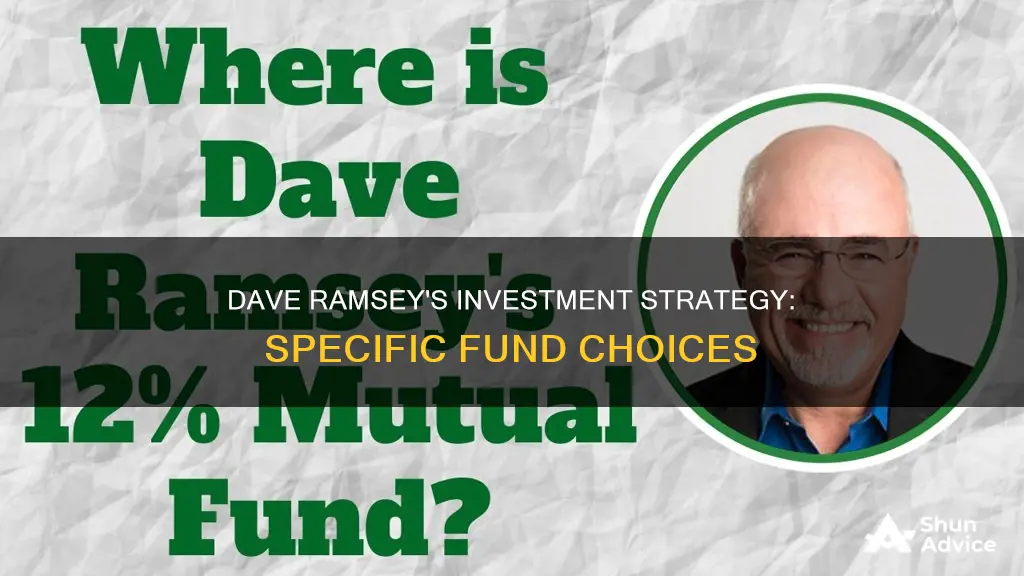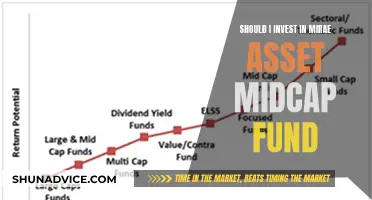
Dave Ramsey is a well-known financial advisor who has helped millions of Americans get out of debt and build wealth. Ramsey's investing philosophy is centred around five key principles: getting out of debt and saving for emergencies, investing 15% of income in tax-advantaged retirement accounts, investing in good growth stock mutual funds, maintaining a long-term perspective, and working with a financial advisor. While Ramsey does not endorse specific funds, he recommends investing in four types of mutual funds: growth and income, growth, aggressive growth, and international. These funds can be further categorised by cap size, including small-cap, medium-cap, and large-cap funds. Additionally, Ramsey suggests investing in front-end load mutual funds, which charge upfront fees, rather than no-load funds, to avoid hidden costs.
| Characteristics | Values |
|---|---|
| Number of types of mutual funds to invest in | 4 |
| Types of mutual funds | Growth and income, growth, aggressive growth, and international |
| Percentage of investment money to put into each fund type | 25% |
| Fund type for stable foundation | Growth and income funds |
| Fund type for moderate growth and volatility | Growth funds |
| Fund type for big gains and losses in a short amount of time | Aggressive growth funds |
| Fund type to spread risk beyond American companies | International funds |
What You'll Learn

Invest in four types of mutual funds: growth, growth and income, aggressive growth, and international
Dave Ramsey recommends investing in four types of mutual funds: growth and income, growth, aggressive growth, and international.
Growth and Income Funds
These funds are considered the "calmest" of the four types, providing slow and steady growth by investing in large-cap companies that rise and fall at a slower rate than smaller companies. These funds are also referred to as large-value, large-cap, blue-chip, dividend income, or equity income funds. They are made up of big, "boring" American companies that have been around for decades and offer goods and services that people use regardless of the state of the economy.
Growth Funds
Growth funds invest in medium-cap companies, creating moderate growth and volatility. They are sometimes called mid-cap or equity funds and are filled with stocks from US companies that are still growing but tend to fluctuate with the stock market.
Aggressive Growth Funds
Aggressive growth funds are the "wild child" of the four types, investing in smaller companies with high growth potential. These funds can experience big gains and losses in a short amount of time. They are also known as emerging market funds or small-cap funds.
International Funds
International funds invest in large companies based outside of the US, helping to spread risk beyond American soil. It is important to distinguish these from global funds, which bundle US and foreign stocks together.
By dividing your investments evenly across these four types of funds, you can lower your investment risk and create a stable and diverse portfolio for long-term wealth building.
Maximizing Your HSA Funds: Smart Investment Strategies
You may want to see also

Invest 15% of income in tax-advantaged retirement accounts
Investing 15% of your income in tax-advantaged retirement accounts is the second principle of Ramsey Solutions' investing philosophy. This is also known as Baby Step 4.
There are two types of tax-advantaged investment accounts: pre-tax and after-tax. Pre-tax investment accounts give you a tax break on your contributions now, but you'll pay taxes on your withdrawals in retirement. After-tax investment accounts, on the other hand, let you enjoy tax-free growth and tax-free withdrawals in retirement.
- If your employer matches contributions to your 401(k), 403(b), or Thrift Savings Plan (TSP), invest up to the match.
- Take advantage of all the Roth you can at work or as an individual. If you have a Roth 401(k) at work, you can invest your entire 15% there.
- If you don't have access to a Roth 401(k), max out a Roth IRA for yourself (and your spouse if you're married).
- If you still haven't reached your 15% goal after maxing out your Roth IRA, keep increasing your contribution to your 401(k), 403(b), or TSP until you hit 15%.
According to Ramsey Solutions, if you invest 15% of your pretax household income from ages 35 to 65 and get an average annual return of 10%, you can expect to have $1.8 million by the time you retire. If your average annual return is 11%, you'll have $2.2 million, and if it's 12%, you'll have $2.8 million.
Skills for Investment Fund Managers: Expertise for Success
You may want to see also

Invest in good growth stock mutual funds
Dave Ramsey recommends investing in good growth stock mutual funds as part of his investing philosophy.
Mutual funds are a great way to build wealth and retire as a millionaire. They are actively and professionally managed, and they allow for dividend reinvestment and instant diversification. Mutual funds are also a safer option than investing in a single company, as they contain stocks from multiple companies, so the overall value of the fund should still go up over time, even if individual stocks fluctuate.
When choosing which mutual funds to invest in, Ramsey suggests looking at the fund's prospectus or online profile, including the fund's investment strategy, risks and rewards. He recommends investing in four types of mutual funds:
Growth and Income Funds (Large Cap)
These funds provide slow and steady growth by investing in large-cap companies that rise and fall more slowly than smaller companies. They are the calmest of the growth stock mutual fund types and are often household names with consistent growth and dividend payments.
Growth Funds (Medium Cap)
These funds invest in medium-cap companies, creating moderate growth and volatility. They are larger, more stable companies that are currently experiencing growth in their market.
Aggressive Growth Funds (Small Cap)
Aggressive growth funds are the "wild child" of your portfolio. They can make big gains and losses in a short amount of time and often invest in startups with high growth potential.
International Funds
International funds help spread risk by investing in large non-US companies. They allow you to invest in companies like BMW, Mercedes and LG.
By dividing your investments evenly between these four types of funds, you create a stable and diverse portfolio for long-term wealth building.
When choosing a mutual fund, Ramsey also recommends looking at the fund manager's experience, the fund's performance (rate of return), fees and turnover ratio. It is important to be patient and not obsess over short-term gains, as investing is a long-term strategy.
Index Funds vs Roth IRA: Where Should You Invest?
You may want to see also

Keep a long-term perspective and invest consistently
Investing is a long-term strategy, and it's important to keep a long-term perspective and invest consistently. The stock market will have its ups and downs, but the key is to stay focused and not panic when there are signs of trouble.
The average annual rate of return for the stock market ranges from 10-12%. Some years will see massive returns, while others might see negative returns. However, if you keep your money invested for the long term, you should see it grow.
It's important to have a consistent savings rate and to invest month after month, year after year, and decade after decade. This is more important than any other investment analysis.
Don't chase returns or get greedy when your investments are up. Similarly, don't panic and sell at the wrong time when things are down. This is how you end up with an empty nest egg and a ton of regret.
Instead, stick with a buy-and-hold strategy and maintain a long-term perspective. This is what the folks who became "Baby Steps Millionaires" did. They didn't freak out over short-term fluctuations but kept investing in their 401(k)s and IRAs every month, regardless of market conditions.
Remember, the top indicator of investment success is your savings rate. So, stay consistent and keep investing!
Bond Fund Investment: What Percentage is Smart to Invest?
You may want to see also

Work with a financial advisor
Working with a financial advisor can be a great idea, even if you're already on your way to achieving your financial goals. A financial advisor can provide valuable insights and direction based on their years of experience. However, it's important to remember that you are the decision-maker and should never invest in anything you don't fully understand. Look for a professional who takes the time to answer your questions and ensures you have all the information you need to make informed choices.
When working with a financial advisor, it's essential to find someone who aligns with your investing philosophy. Dave Ramsey's investing philosophy includes five key principles:
- Get out of debt and save up a fully funded emergency fund first: This means getting rid of all debt except your mortgage and building an emergency fund of 3-6 months' worth of expenses before investing elsewhere.
- Invest 15% of your income in tax-advantaged retirement accounts: Take advantage of tax-advantaged investment accounts, such as pre-tax and after-tax investment accounts, to maximize your investment returns.
- Invest in good growth stock mutual funds: Mutual funds offer instant diversification and professional fund management. Ramsey recommends investing in four types of mutual funds: growth and income, growth, aggressive growth, and international.
- Keep a long-term perspective and invest consistently: Adopt a buy-and-hold strategy and maintain a long-term perspective, focusing on consistent investing rather than chasing short-term returns.
- Work with a financial advisor: Collaborating with a financial advisor can provide guidance, ensure you stay on track, and help you navigate market chaos, inflation, and other factors that impact your financial future.
When choosing a financial advisor, consider using a service like SmartVestor, which can connect you with vetted investment professionals in your area. These professionals can guide you through the investing process and help you make informed choices based on your unique situation. Remember, investing is a long-term journey, and working with a financial advisor can provide valuable support along the way.
Mutual Fund Investing: What You Need to Know
You may want to see also







